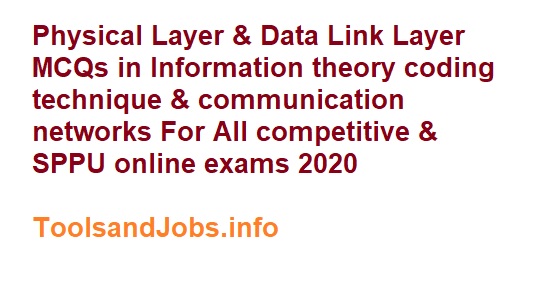Physical Layer & Data Link Layer MCQs in Information theory coding technique & communication networks For All competitive & SPPU online exams 2020 Part 1
Before solving this i suggest read this to easy this objectives
1. In a Go-Back-N ARQ, if the window size is 63, what is the range of sequence
numbers?
a) 0 to 63
b) 0 to 64
c) 1 to 63
d) 1 to 64
Ans - C
2. In Go-Back-N ARQ, if frames 4, 5, and 6 are received successfully, the receiver
may send an ACK _______ to the sender.
a) 5
b) 6
c) 7
d) any of the above
Ans - C
3. ARQ stands for _______.
a) Automatic repeat quantization
b) Automatic repeat request
c) Automatic retransmission request
d) Acknowledge repeat request
Ans - D
4. ______ in the data link layer separates a message from one source to a
destination, or from other messages going from other sources to other
destinations.
a) Digitizing
b) Controlling
c) Framing
d) none of the above
Ans - B
5. For Stop-and-Wait ARQ, for 10 data packets sent, _______ acknowledgments are
needed.
a) exactly 10
b) less than 10
c) more than 10
d) none of the above.
Ans - D
6. HDLC is an acronym for _______. ___
a) High-duplex line communication
b) High-level data link control
c) Half-duplex digital link combination
d) Host double-level circuit
Ans - A
7. Data link control deals with the design and procedures for ______ communication.
a) node-to-node
b) host-to-host
c) process-to-process
d) none of the above
Ans - B
8. In _______ framing, there is no need for defining the boundaries of frames.
a) fixed-size
b) variable-size
c) standard
d) none of the above
Ans- C
9. In ________ framing, we need a delimiter (flag) to define the boundary of two
frames.
a) fixed-size
b) variable-size
c) standard
d) none of the above
Ans - A
10. _________framing uses two categories of protocols: character-oriented and bitoriented.
a) fixed-size
b) variable-size
c) standard
d) none of the above
Ans - D
11. In a ________ protocol, the data section of a frame is a sequence of characters.
A) bit-oriented
B) character-oriented
C) either (a) or (b)
D) none of the above
Ans - B
12. In a _________ protocol, the data section of a frame is a sequence of bits.
A) byte-oriented
B) bit-oriented
C) either (a) or (b)
D) none of the above
Ans - A
13. In _________ protocols, we use ________.
A) character-oriented; byte stuffing
B) character-oriented; bit stuffing
C) bit-oriented; character stuffing
D) none of the above
Ans - D
14. Byte stuffing means adding a special byte to the data section of the frame when
there is a character with the same pattern as the ______.
A)header
B) trailer
C) flag
D) none of the above
Ans - C
15. In ________ protocols, we use ________.
A) character-oriented; byte stuffing
B) character-oriented; bit stuffing
C) bit-oriented; character stuffing
D) none of the above
Ans - D
16. a sequence of bits with the same pattern as the ________.
A)header
B) trailer
C) flag
D) none of the above
Ans - C
17. _______ control refers to a set of procedures used to restrict the amount of data
that the sender can send before waiting for acknowledgment.Test error is also
always zero
a) Flow
b) Transmission
c) Error
d) none of the above
Ans - C
18. ______ control refers to methods of error detection and correction.
a) Flow
b) Transmission
c) Error
d) none of the above
Ans - A
19. Overhead bits are
a. Framing and synchronizing bits
b. Data due to noise
c. Encoded bits
d. None of the above
Ans - A
20. Which type of ARQ system introduces the transmission delay
between the transmitter and receiver before the reception of
frame at receiver for the purpose of error detection?
a. Go-back-N ARQ
b. Selective Repeat ARQ
c. Stop-and-Wait ARQ
d. None of the above
Ans - C
21. At any given time, the output of an encoder depends on_____
a. Past input
b. Present input
c. Both a and b
d. None of the above
Ans - C
22. The computer network is
A) Network computer with cable
B) Network computer without cable
C) Both of the above
D) None of the above
Ans - C
23. FDDI used which type of physical topology?
A) Bus
B) Ring
C) Star
D) Tree
Ans - B
24. FTP stands for
A) File transfer protocol
B) File transmission protocol
C) Form transfer protocol
D) Form transmission protocol
Ans - A
25. Ethernet system uses which of the following technology.
A) Bus
B) Ring
C) Star
D) Tree
Ans - A
26. Which of the following are the network services?
A) File service
B) Print service
C) Database service
D) All of the above
Ans - D
27. If all devices are connected to a central hub, then topology is called
A) Bus Topology
B) Ring Topology
C) Star Topology
D) Tree Topology
Ans - C
28. FDDI stands for
A) Fiber Distributed Data Interface
B) Fiber Data Distributed Interface
C) Fiber Dual Distributed Interface
D) Fiber Distributed Data Interface
Ans - A
29. Which of the following is an application layer service?
A) Network virtual terminal
B) File transfer, access and management
C) Mail service
D) All of the above
Ans - C
30. Which is the main function of transport layer?
A) Node to node delivery
B) End to end delivery
C) Synchronization
d) Updating and maintaining routing tables
Ans - B
31. The .............. layer change bits onto electromagnetic signals.
A) Physical
B) Transport
C) Data Link
D) Presentation
Ans - A
32. In mesh topology, relationship between one device and another is ..............
A) Primary to peer
B) Peer to primary
C) Primary to secondary
D) Peer to Peer
Ans - D
33. The performance of data communications network depends on ..............
A) Number of users
B) The hardware and software
C) The transmission
D) All of the above
Ans - D
34. Find out the OSI layer, which performs token management.
A) Network Layer
B) Transport Layer
C) Session Layer
D) Presentation Layer
Ans - C
35. The name of the protocol which provides virtual terminal in TCP/IP model is.
A) Telnet
B) SMTP
C) HTTP
Ans - A
36. The layer one of the OSI model is
A) Physical layer
B) Link layer
C) Router layer
D) Broadcast layer
Ans - A
37. What is the name of the network topology in which there are bi-directional links
between each possible node?
A) Ring
B) Star
C) Tree
D) Mesh
Ans - D
38. What is the commonly used unit for measuring the speed of data transmission?
A) Bytes per second
B) Baud
C) Bits per second
D) Both B and C
Ans - B
39. Which of the communication modes support two way traffic but in only once direction of a
time?
A) Simplex
B) Half-duplex
C) Three - quarter's duplex
D) Full duplex
Ans - B
40. The loss in signal power as light travels down the fiber is called .............
A) Attenuation
B) Propagation
C) Scattering
D) Interruption
Ans - A


